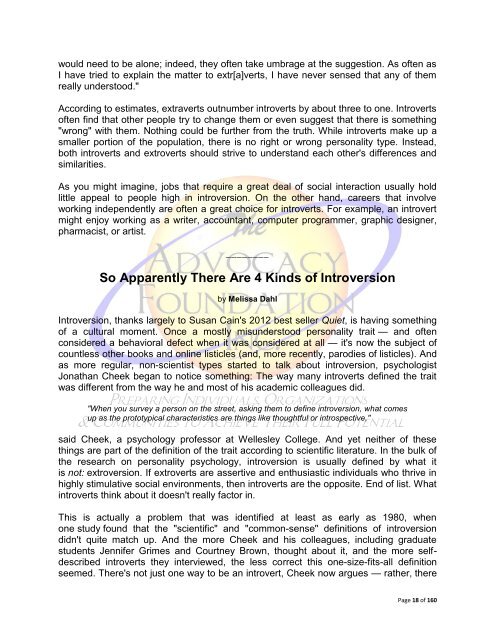The Gift of Introversion
The Gift of Introversion
The Gift of Introversion
Create successful ePaper yourself
Turn your PDF publications into a flip-book with our unique Google optimized e-Paper software.
would need to be alone; indeed, they <strong>of</strong>ten take umbrage at the suggestion. As <strong>of</strong>ten as<br />
I have tried to explain the matter to extr[a]verts, I have never sensed that any <strong>of</strong> them<br />
really understood."<br />
According to estimates, extraverts outnumber introverts by about three to one. Introverts<br />
<strong>of</strong>ten find that other people try to change them or even suggest that there is something<br />
"wrong" with them. Nothing could be further from the truth. While introverts make up a<br />
smaller portion <strong>of</strong> the population, there is no right or wrong personality type. Instead,<br />
both introverts and extroverts should strive to understand each other's differences and<br />
similarities.<br />
As you might imagine, jobs that require a great deal <strong>of</strong> social interaction usually hold<br />
little appeal to people high in introversion. On the other hand, careers that involve<br />
working independently are <strong>of</strong>ten a great choice for introverts. For example, an introvert<br />
might enjoy working as a writer, accountant, computer programmer, graphic designer,<br />
pharmacist, or artist.<br />
________<br />
So Apparently <strong>The</strong>re Are 4 Kinds <strong>of</strong> <strong>Introversion</strong><br />
by Melissa Dahl<br />
<strong>Introversion</strong>, thanks largely to Susan Cain's 2012 best seller Quiet, is having something<br />
<strong>of</strong> a cultural moment. Once a mostly misunderstood personality trait — and <strong>of</strong>ten<br />
considered a behavioral defect when it was considered at all — it's now the subject <strong>of</strong><br />
countless other books and online listicles (and, more recently, parodies <strong>of</strong> listicles). And<br />
as more regular, non-scientist types started to talk about introversion, psychologist<br />
Jonathan Cheek began to notice something: <strong>The</strong> way many introverts defined the trait<br />
was different from the way he and most <strong>of</strong> his academic colleagues did.<br />
"When you survey a person on the street, asking them to define introversion, what comes<br />
up as the prototypical characteristics are things like thoughtful or introspective,"<br />
said Cheek, a psychology pr<strong>of</strong>essor at Wellesley College. And yet neither <strong>of</strong> these<br />
things are part <strong>of</strong> the definition <strong>of</strong> the trait according to scientific literature. In the bulk <strong>of</strong><br />
the research on personality psychology, introversion is usually defined by what it<br />
is not: extroversion. If extroverts are assertive and enthusiastic individuals who thrive in<br />
highly stimulative social environments, then introverts are the opposite. End <strong>of</strong> list. What<br />
introverts think about it doesn't really factor in.<br />
This is actually a problem that was identified at least as early as 1980, when<br />
one study found that the "scientific" and "common-sense" definitions <strong>of</strong> introversion<br />
didn't quite match up. And the more Cheek and his colleagues, including graduate<br />
students Jennifer Grimes and Courtney Brown, thought about it, and the more selfdescribed<br />
introverts they interviewed, the less correct this one-size-fits-all definition<br />
seemed. <strong>The</strong>re's not just one way to be an introvert, Cheek now argues — rather, there<br />
Page 18 <strong>of</strong> 160

















